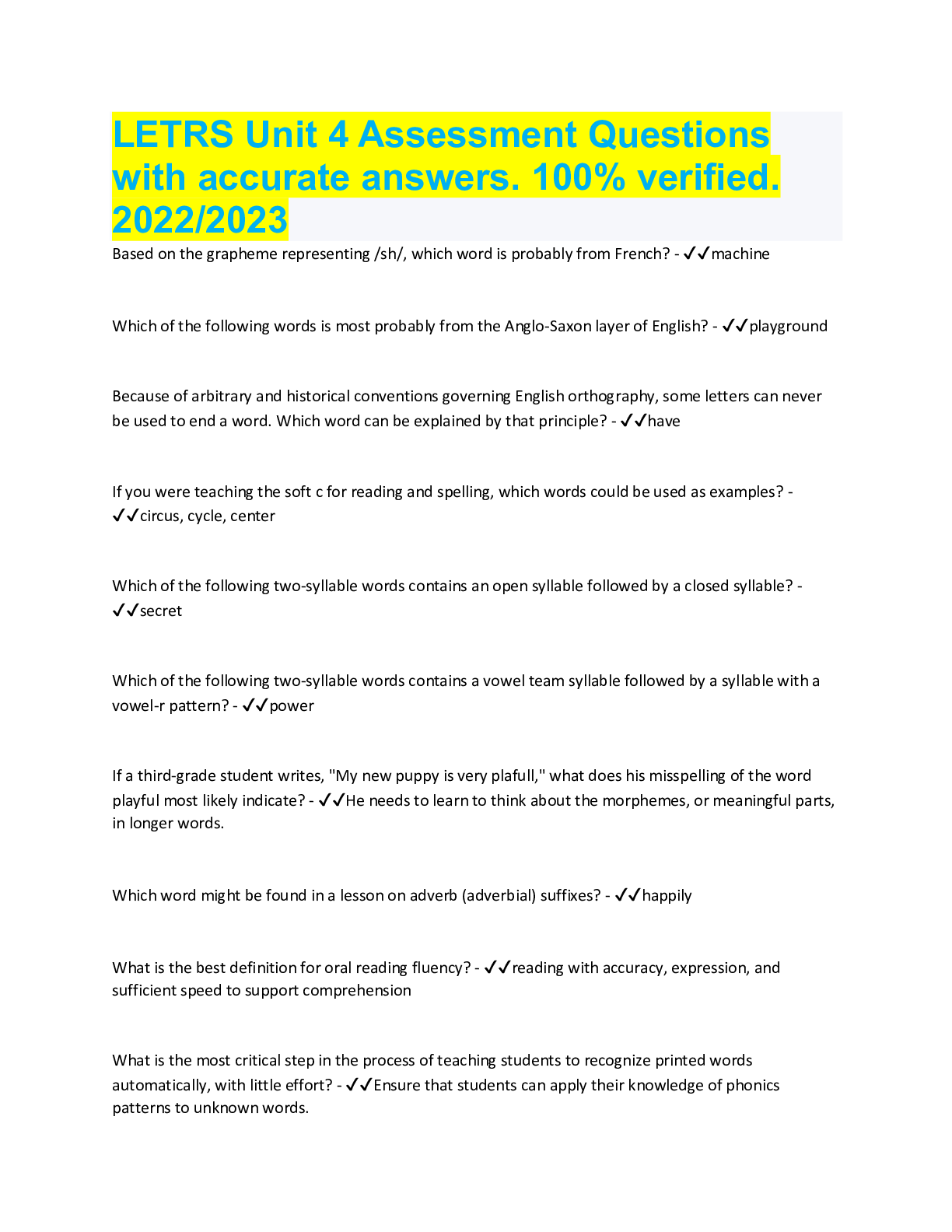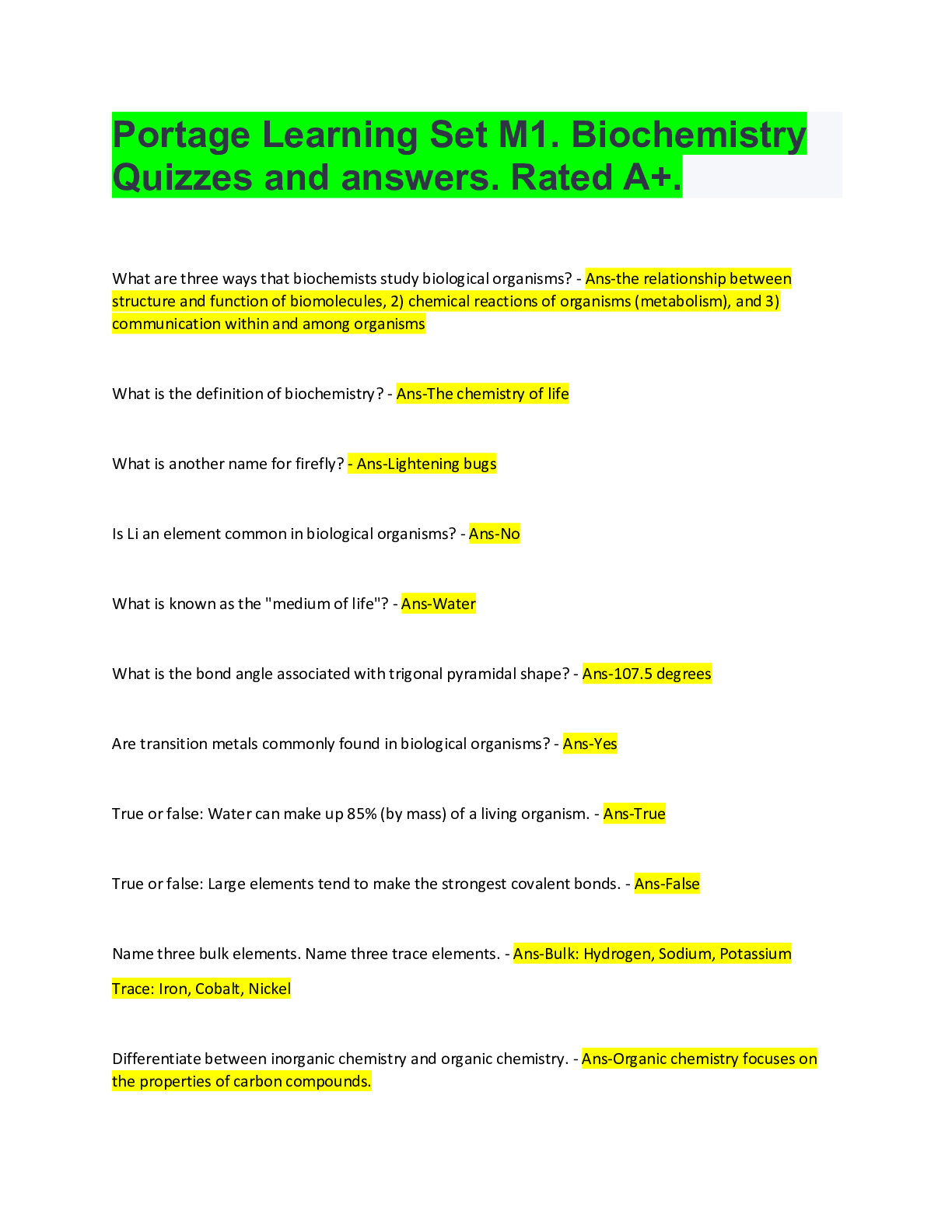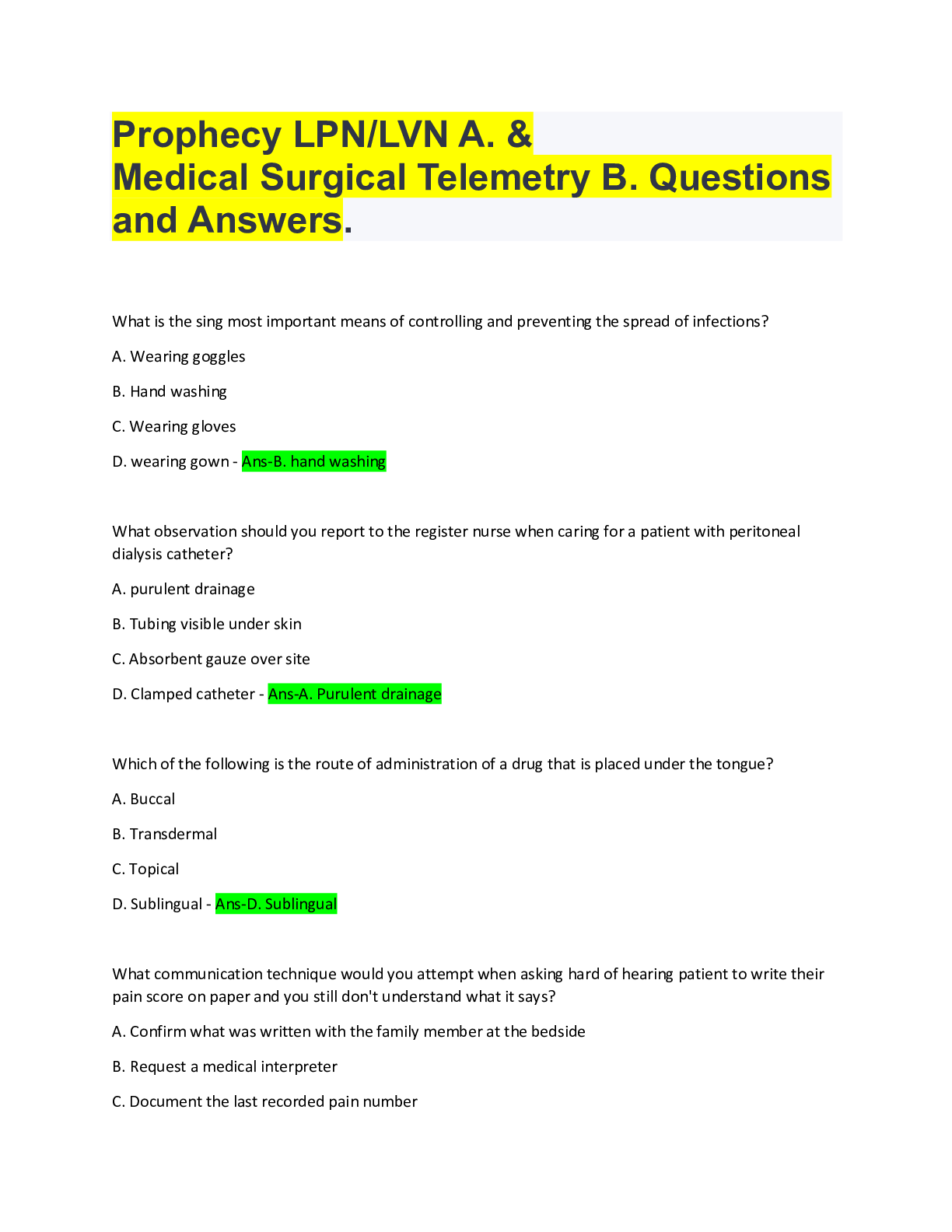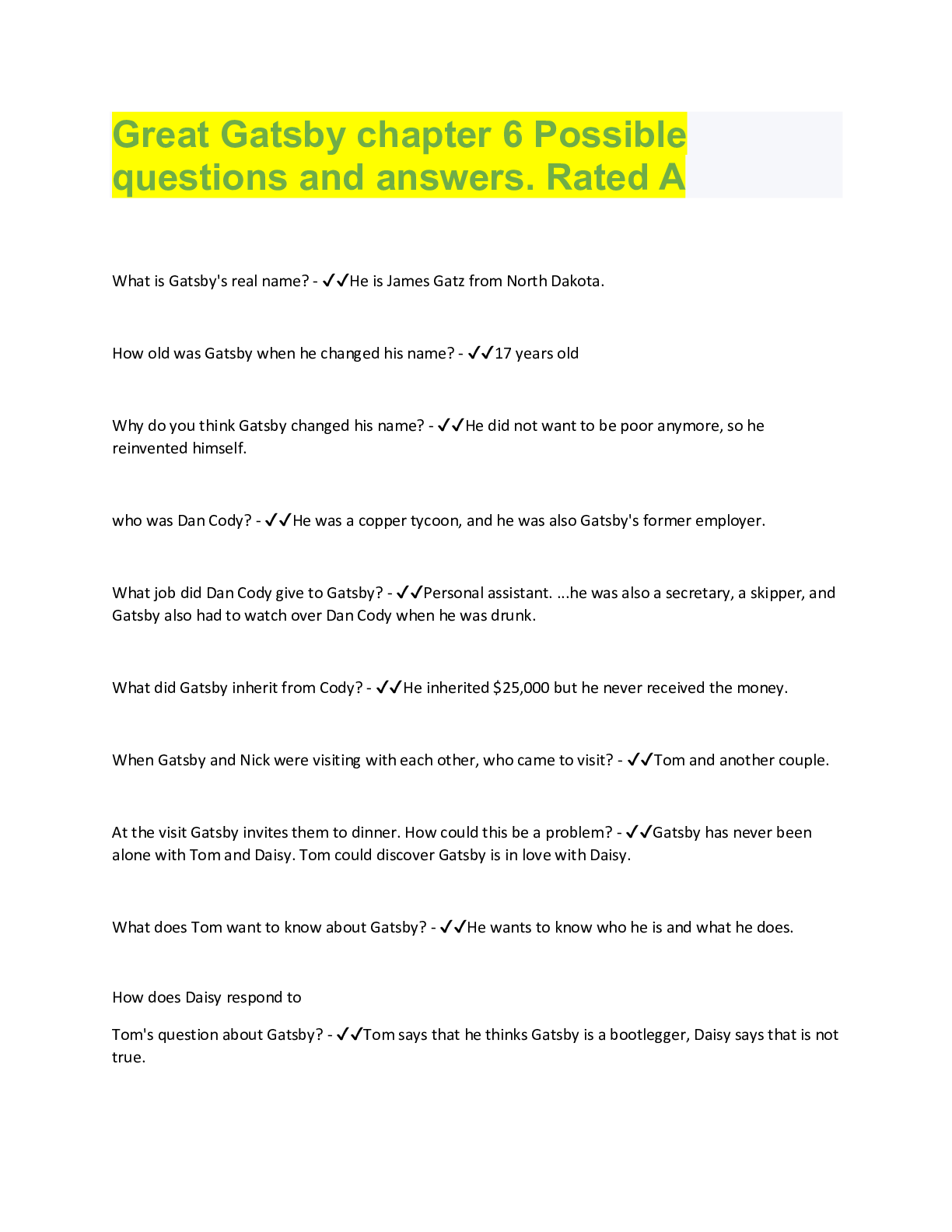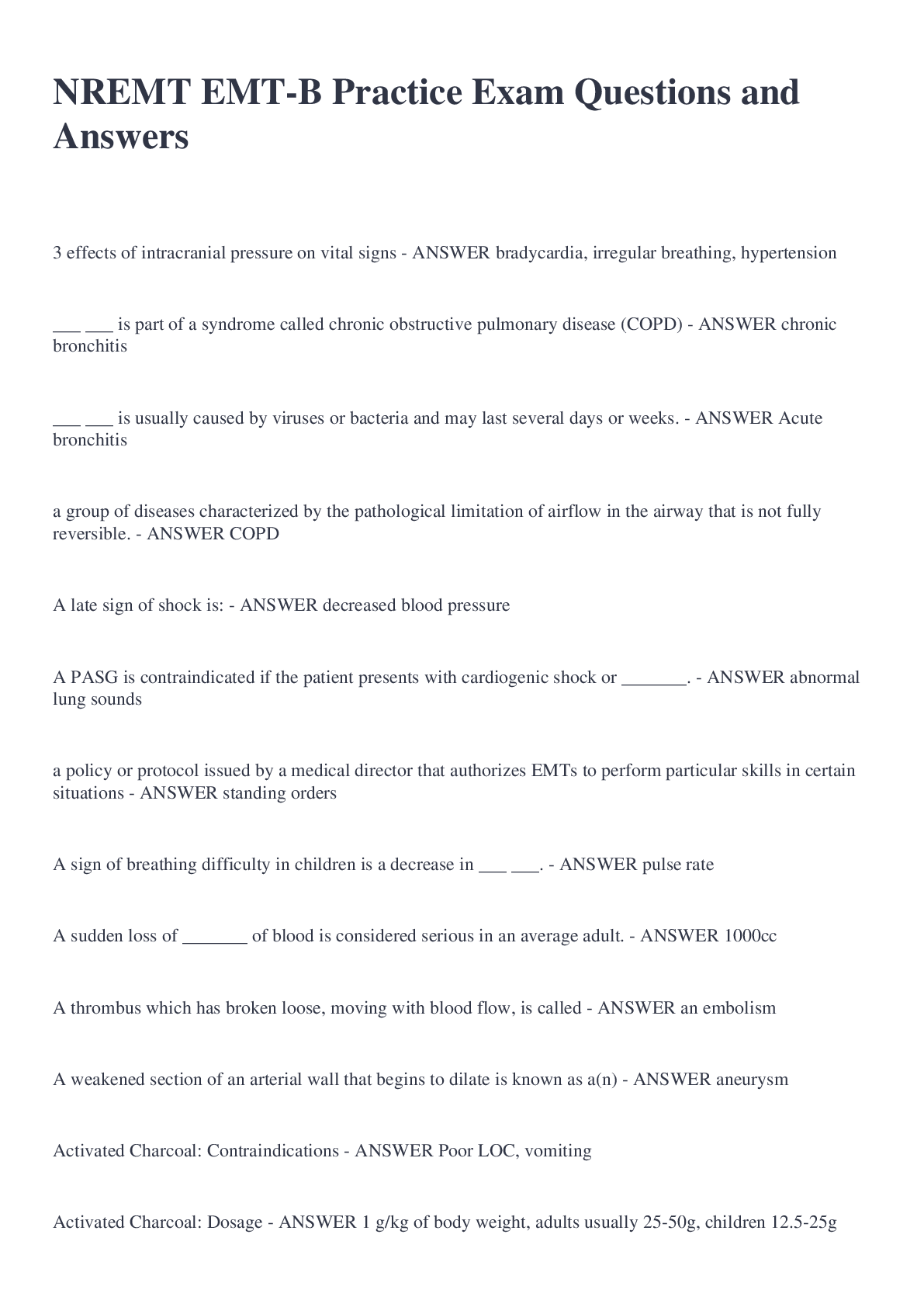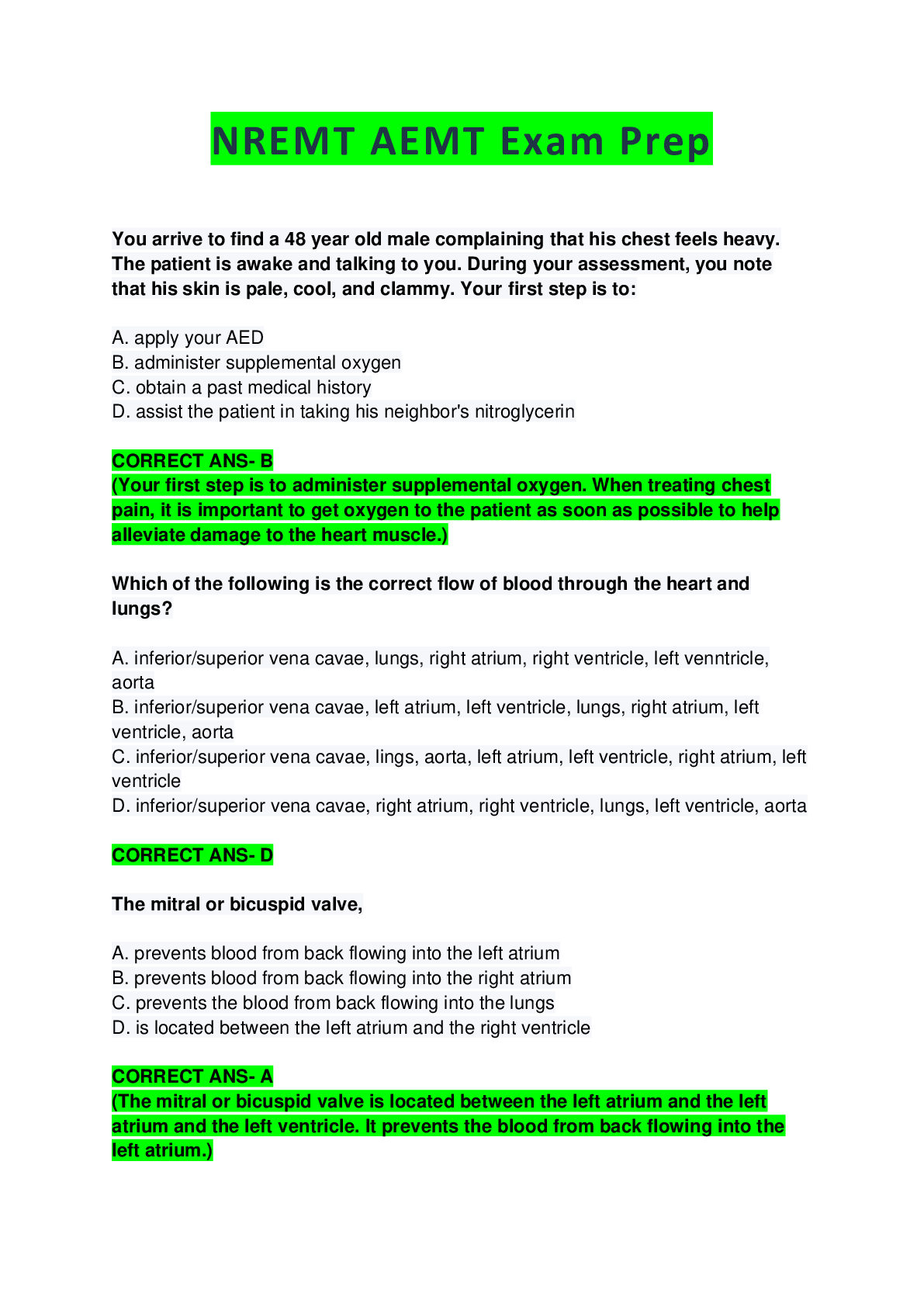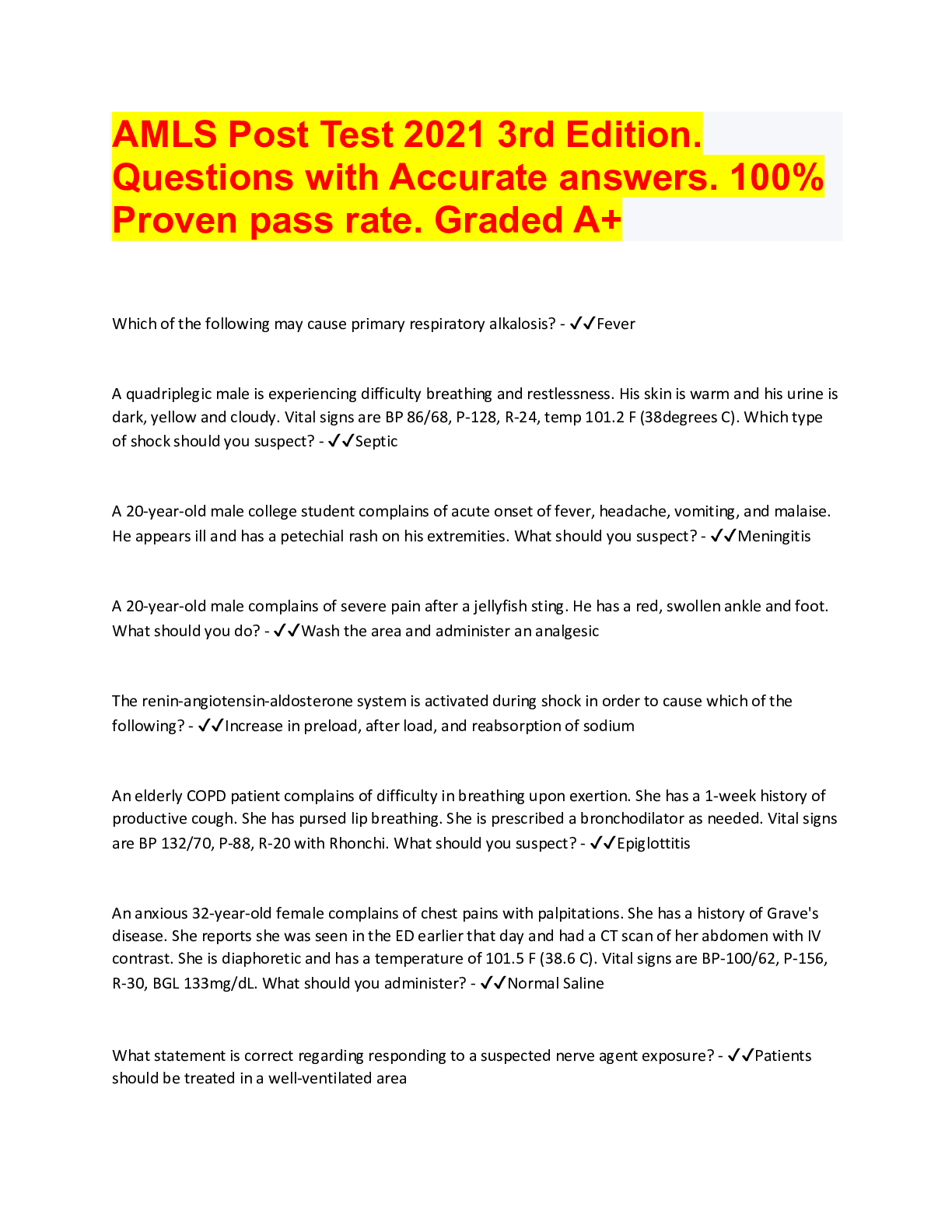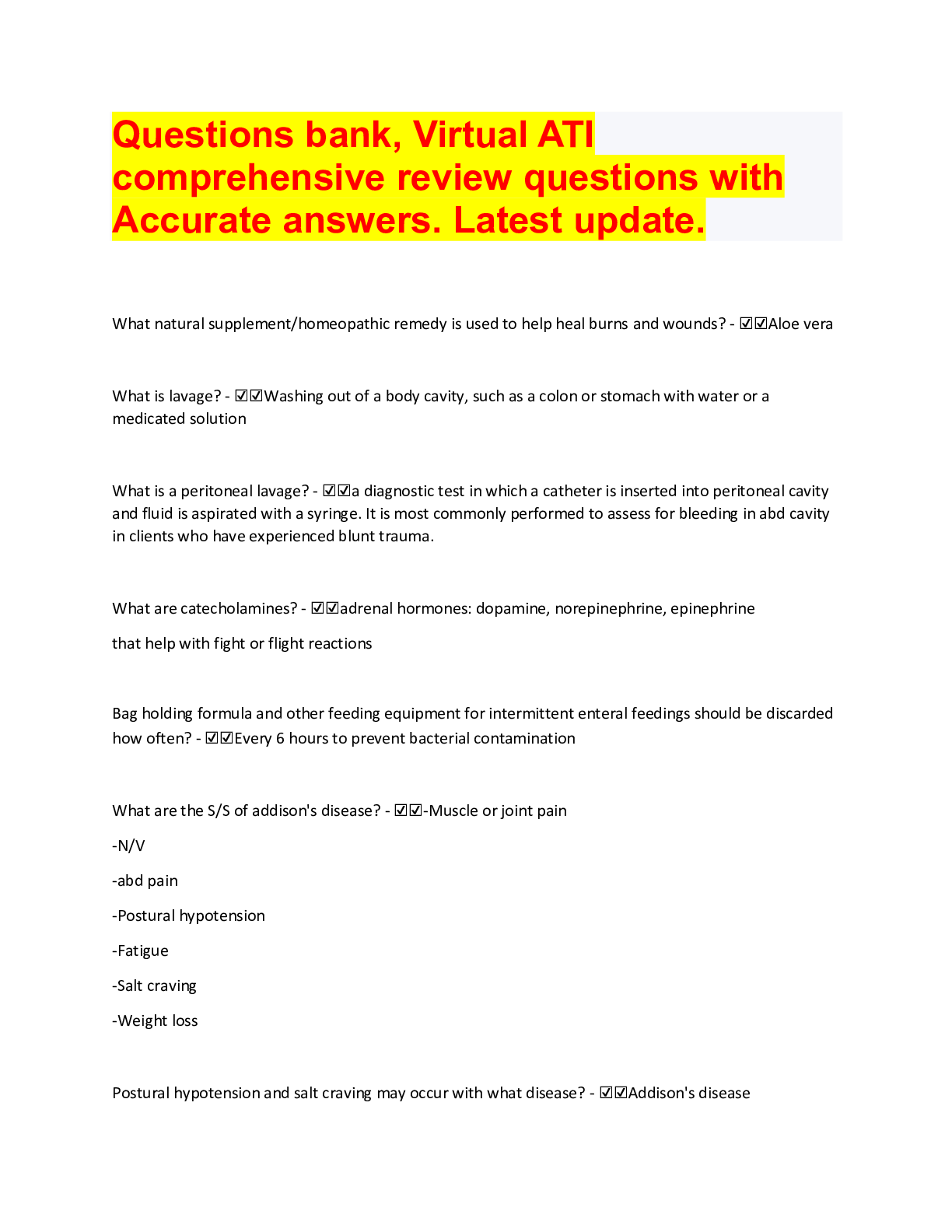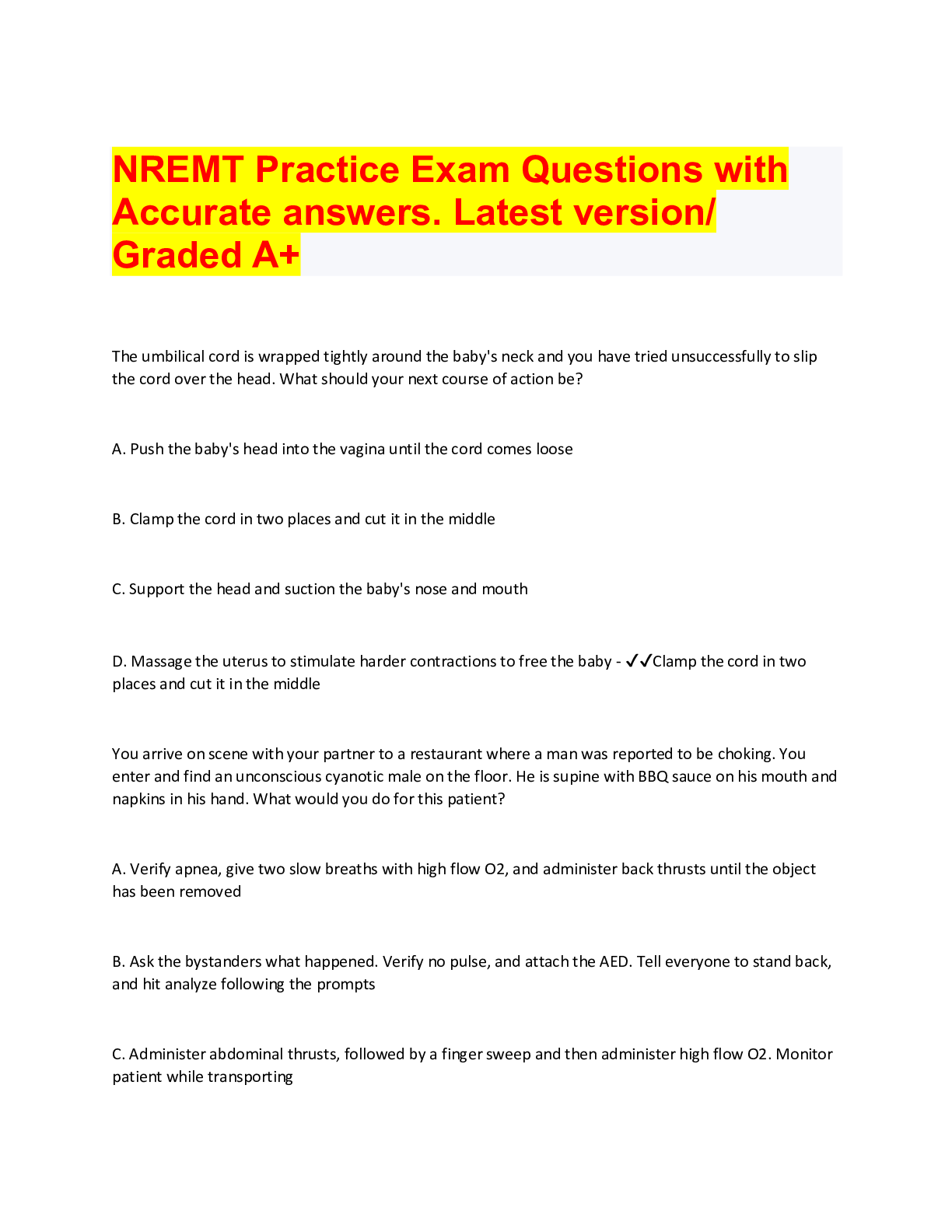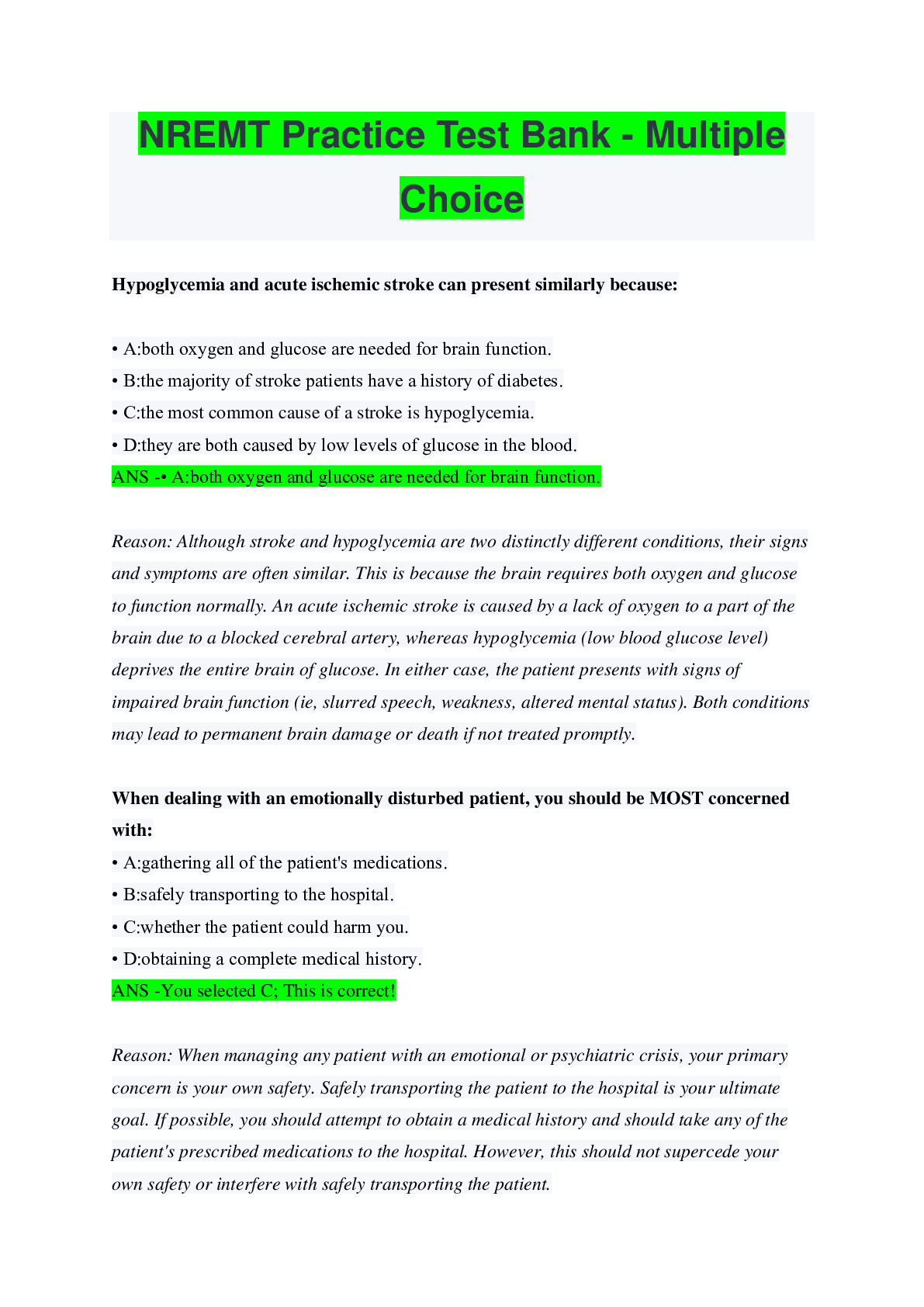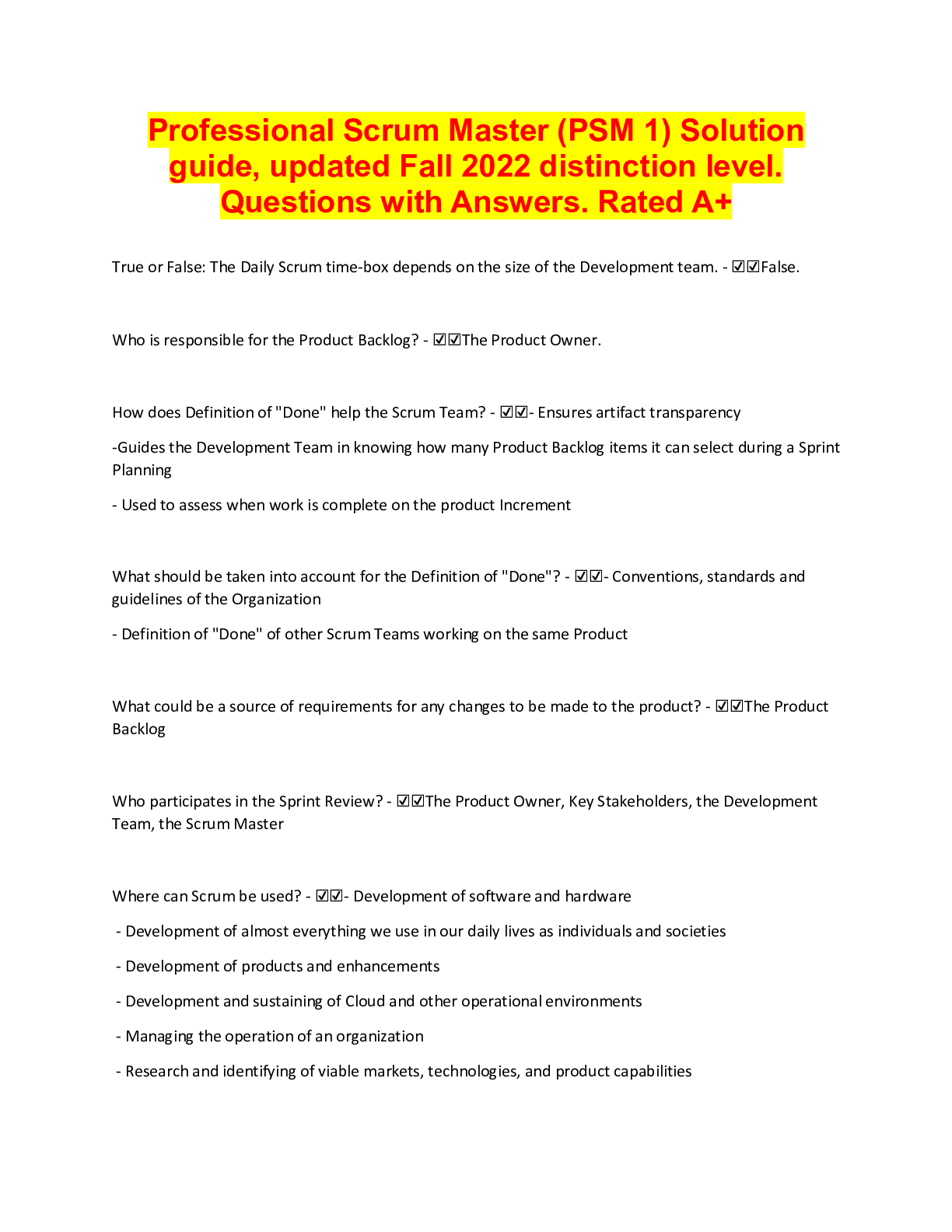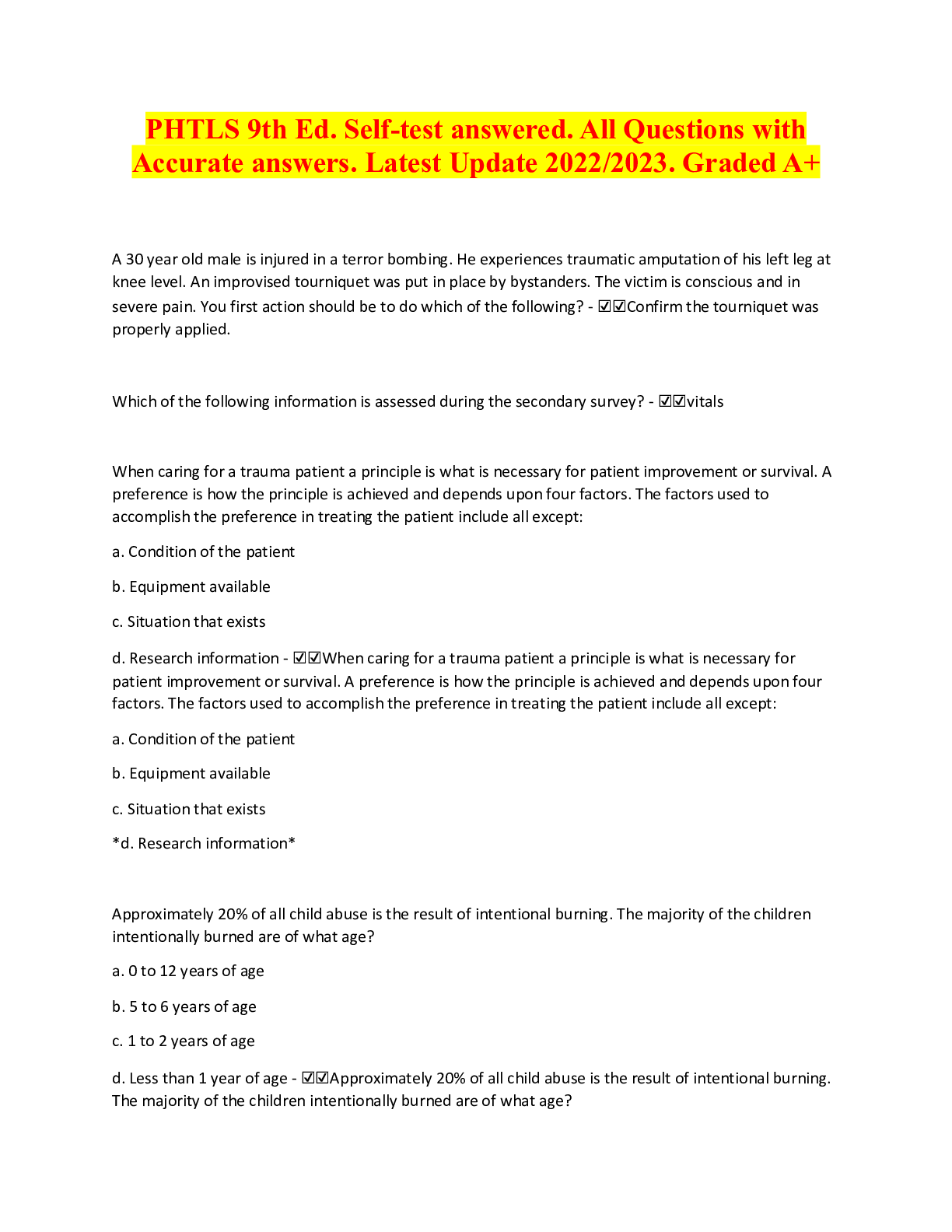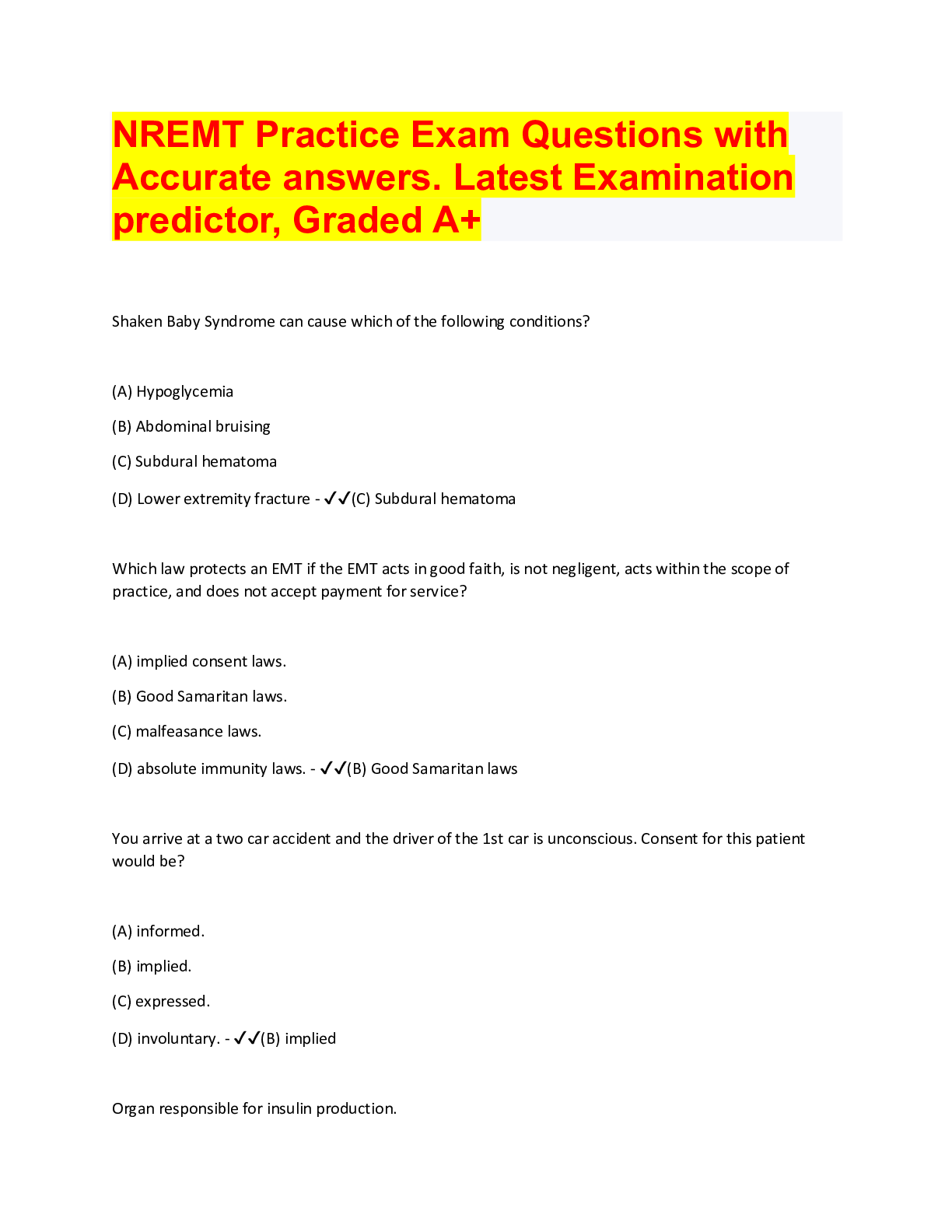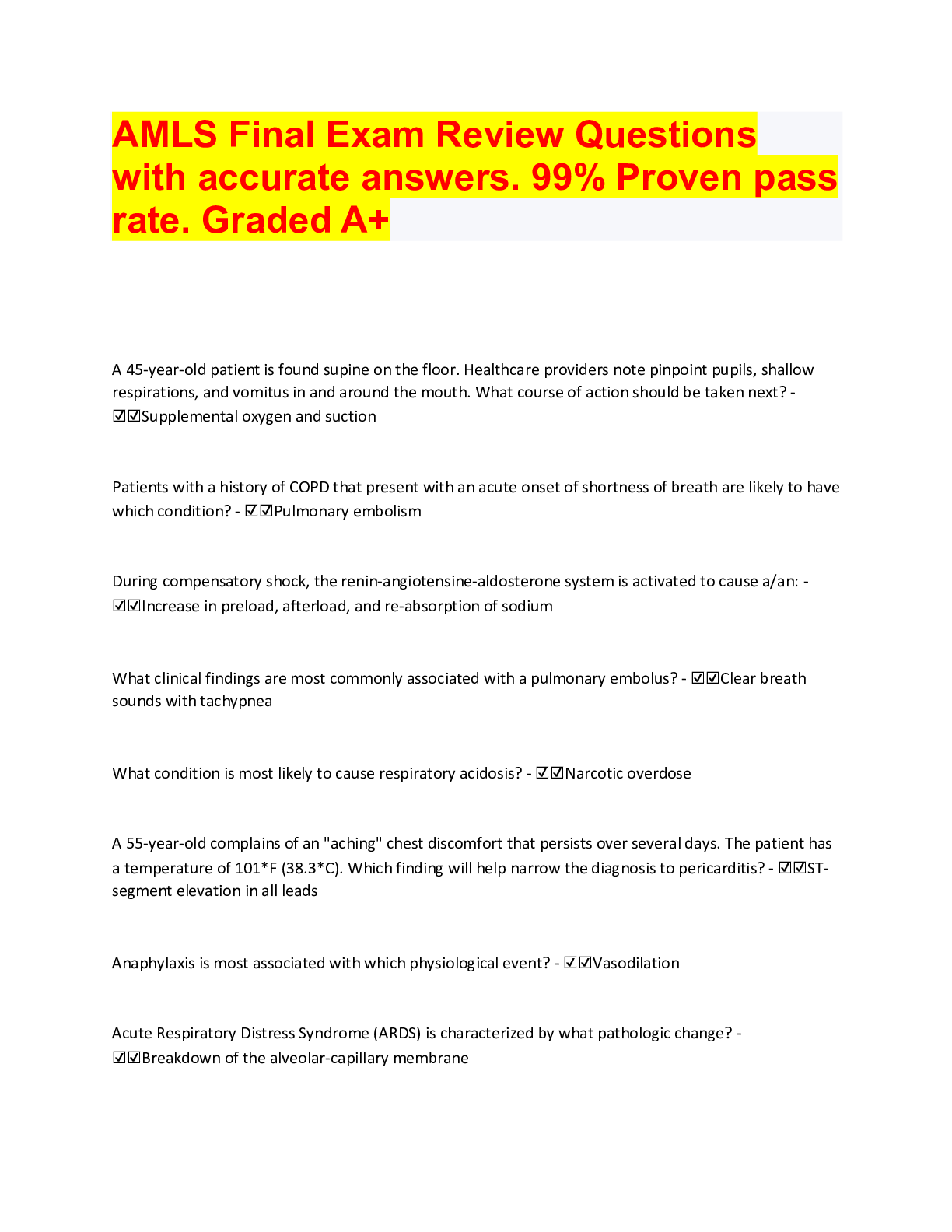Real Estate > QUESTIONS & ANSWERS > National PSI Broker Exam prep. Questions with accurate answers. Rated A+. (All)
National PSI Broker Exam prep. Questions with accurate answers. Rated A+.
Document Content and Description Below
National PSI Broker Exam prep. Questions with accurate answers. Rated A+. A broker is completing a CMA to determine the potential listing price of a seller's home. Which of the following is NOT... part of the final CMA given to the seller? A) Highest and best use evaluation B) Comparable sales analysis C) Adjustments to past sales D) Pictures of comparables -✔✔-A) The answer is highest and best use evaluation. An appraiser does a highest and best use evaluation, which does not appear in a CMA. Houses in the local area have had an increase in sales price and a decrease in days on the market. A broker who is attempting to determine the current market value for a residential listing would get the BEST estimate of value by using A) a GRM as the primary consideration to determine value. B) the cost approach with reproduction estimates. C) comparables that are no more than six months old. D) comparables that are no more than 12 months old. -✔✔-C) The answer is comparables that are no more than six months old. In a changing market, the more recent the comparables, the more likely they are to reflect upward or downward price changes. Rental rates have increased by 2% in the last six months. Which appraisal principle BEST explains this rate increase? A) Principle of substitution B) Principle of supply and demand C) Principle of contribution D) Principle of highest and best use -✔✔-B) The answer is principle of supply and demand. The principle of supply and demand states that as fewer properties become available for rent or sale, the price owners can charge will increase. The current monthly GRM in a neighborhood is 200, and the annual income is $24,000. What is the estimated value of a property in this neighborhood? A) $200,000 B) $240,000 C) $400,000 D) $4,800,000 -✔✔-C) The answer is $400,000. Monthly GRM × monthly income = value. 200 × 2,000 ($24,000 ÷ 12) = $400,000. The subject property has two baths and one fireplace. The property across the street sold for $181,000 and has two baths and two fireplaces. The property behind the subject sold for $175,000 and has two baths and no fireplace. In the area, baths are worth $5,000 and fireplaces are worth $3,000. What is the subject property worth? A) $175,000 B) $177,000 C) $178,000 D) $180,000 -✔✔-The answer is $178,000 Subject Property Comp 1 $181,000 Comp 2 $175,000 2 baths 2 baths no adjustment 2 baths no adjustment 1 fireplace 2 fireplaces - $3,000 No fireplace + $3,000 Adjusted price $178,000 Adjusted price $178,000 According to federal government lending regulations, a buyer purchasing a home must have an appraisal for all the following types of financing EXCEPT A) FHA. B) VA. C) loan sold to FNMA. D) seller carry. -✔✔-D) The answer is seller carry. All government loans and any sold on the secondary market require an appraisal. A seller-carry loan, or seller financing, may or may not require an appraisal. A buyer chooses a loan with an LTV ratio of 90%, which requires the purchase of PMI, instead of a loan with an 80% LTV, which would not require the insurance. The buyer MOST likely made this choice because A) if the buyer defaults, PMI will protect the buyer by paying off the full loan. B) the buyer will make a larger down payment but have smaller monthly payments, including PMI. C) paying PMI will mean that all mortgage payments and homeowners association fees are deferred in case of default. D) the buyer wants a smaller down payment, even though the buyer will have to pay PMI. -✔✔-D) The answer is the buyer wants a smaller down payment, even though the buyer will have to pay PMI. Buyers are willing to pay PMI (private mortgage insurance) in order to bring a smaller down payment to closing, which will mean a higher monthly payment. PMI protects lenders in case of default. A buyer is getting a new mortgage with a 95% loan-to-value ratio. The final loan amount the lender will lend the buyer is determined by the A) lower of the sales price or appraised value. B) higher of the sales price or appraised value. C) sales price only. D) appraised value only. -✔✔-A) The answer is lower of the sales price or appraised value. The loan-to-value (LTV) ratio is determined by the lower of the sales price or appraised value. The difference between using a partially amortized loan or an interest-only term loan is that the partially amortized loan would result in A) smaller payments and a smaller balloon payment. B) larger payments and a smaller balloon payment. C) smaller payments and a larger balloon payment. D) larger payments and a larger balloon payment. -✔✔-B) The answer is larger payments and a smaller balloon payment. In a partially amortized loan, the loan payments include a partial payment toward principal. While the payments will be larger, the balloon payment will be smaller, due to some principal payoff. With an interest-only loan, the original principal and the final balloon payment are the same because there was no payment made toward the principal. A borrower is using leverage on a new home loan at 90% loan to value. The disadvantage of this type of leveraging is that A) the borrower is at higher risk of defaulting on the loan. B) it allows the borrower to pay less interest over the life of the loan. C) a larger down payment is required. D) there is rarely any requirement for PMI. -✔✔-A) The answer is the borrower is at higher risk of defaulting on the loan. Leverage is using someone else's money; the higher the leverage, the higher the risk of default. Because leveraging implies a high LTV, equity does not build faster, and the loan may require private mortgage insurance (PMI) if there is a small down payment. A property owner has a large amount of equity in his home but does not want to sell it to gain access to his money. What type of loan could the owner use to access the equity in his home without having to make monthly loan payments? A) Contract for deed B) Purchase money mortgage C) Reverse mortgage D) Growth equity mortgage -✔✔-C) The answer is reverse mortgage. In a reverse mortgage, the lender makes payments to the borrower each month. There are requirements such as age and equity in the property for this type of loan. A lender in first position filed documents to initiate foreclosure on a property. The borrower offered to give the lender a deed in lieu of foreclosure. If the lender accepts the deed in lieu, which of the following is TRUE? A) The lender must continue with the foreclosure. B) Upon receiving the deed, the lender acquires the property free and clear of all liens. C) The lender will take title subject to any junior liens. D) The lender needs to obtain a mortgagee's title policy to clear all liens. -✔✔-C) The answer is the lender will take title subject to any junior liens. The foreclosure process removes all liens, but if a lender takes a deed in lieu of foreclosure, any junior liens are still attached and would become the obligation of the lender. There is no reason to continue the foreclosure process because the lender will become the owner and title policies find encumbrances but do not release them. A seller has agreed to act as the buyer's bank. The seller and the buyer signed a contract for deed to help the buyer purchase the seller's home. When will the buyer receive possession and title? A) Full rights of possession and full legal title are received upon making the final loan payment. B) Partial legal title and full rights of possession are received at closing. C) Title is received as agreed to in the contract, and possession is received upon making the final loan payment. D) Possession is received as agreed to in the contract, and title is received upon making the final loan payment. -✔✔-D) The answer is possession is received as agreed to in the contract, and title is received upon making the final loan payment. A contract for deed is a type of seller financing in which the seller holds the deed/title until the buyer has made the final payment. The buyer takes possession as defined in the contract, typically upon payment of the down payment, and will receive title when final payment to the seller is made. A contract for the purchase of real property might be terminated by all of the following EXCEPT A) the buyer, while under contract, has found a different property he prefers and has asked the seller to terminate so he can purchase the other property. B) a buyer sends written notice during the financing contingency; he is terminating the contract due to being unable to qualify for a loan and requests the return of earnest money. C) the buyer has given the seller a large amount of repair items and the seller and the buyer have agreed to mutually rescind the agreement due to inspection issues. D) the buyer found out the property is not zoned to be used as the buyer wishes. The buyer sends a notice to terminate based upon the contract contingency giving the buyer 10 days to verify the property use. - ✔✔-A) The answer is the buyer, while under contract, has found a different property heprefers and has asked the seller to terminate so he can purchase the other property. Contingencies allow a buyer time to determine items such as zoning and ability to qualify for a loan. The buyer and the seller can mutually agree to terminate. The buyer cannot terminate unilaterally, without being in default and losing the earnest money, because he wants to buy a different property. Which of the following is TRUE about the executory stage of a contract to purchase real property? A) The seller has possession and equitable title. B) The buyer has legal title and possessory rights once all the contingencies have terminated. C) This stage is for the seller to determine if the buyer's offer is acceptable or if the seller should counteroffer. D) The seller has legal title and the buyer is the equitable owner until title is conveyed at closing. -✔✔- D) The answer is the seller has legal title and the buyer is the equitable owner until title is conveyed at closing. The seller has possession and legal title until the deed is delivered to the buyer conveying title. A property is under contract. During the inspection, the buyer finds major structural issues that the seller is unable to correct before closing. The buyer and the seller agree to terminate the contract, which is known as A) a valid contract which has become voidable by both parties. B) specific performance for both parties with no monetary remedy. C) mutual rescission of the contract. D) a void contract with parties in agreement. -✔✔-C) The answer is mutual rescission of the contract. Mutual rescission is when both parties return to their original state with all things of value, such as earnest money, also returned. A buyer has requested that the seller give him a six-month opportunity to purchase the seller's property for $400,000 with 10% down. The buyer has agreed to give the seller $4,000 to hold the offer open for the next six months, with the seller keeping the $4,000 if the buyer decides not to purchase. The contract is A) an open listing agreement. B) an option agreement. C) an implied sales agreement with both parties bound. D) a bilateral agreement with both the buyer and seller bound because there was a payment. -✔✔-B) The answer is an option agreement. An option is a unilateral agreement that sets the sales price and terms but also gives the buyer the option not to buy the property. If the buyer decides not to buy, an option contract does not allow the seller to sue (recourse). In this case, the seller will keep the buyer's option money. A minor has inherited a large old house from her father. The minor sells it to her aunt. Is the purchase contract valid? A) Yes, it is valid and enforceable. B) No, it is void. C) No, it is voidable by the minor. D) No, it is unenforceable by the minor. -✔✔-C) The answer is no, it is voidable by the minor. Contracts with minors entered into by adults are always voidable by the minor. All of the following are common law requirements for a valid listing agreement EXCEPT A) a definite termination date. B) specific performance remedies should one of the parties default. C) a negotiable commission clause. D) be an expressed written agreement in order to enforce the commission clause. -✔✔-B) The answer is specific performance remedies should one of the parties default. Listings that are employment agreements do not have specific performance remedies. Specific performance is used in purchase agreements, not in employment agreements. Legal agreements may be valid, void, or voidable, depending on whether they contain all the required essential elements of a contract. All of the following would make a contract voidable EXCEPT A) it isn't in writing. B) a minor has signed the document. C) the buyer is under duress. D) the broker misrepresented the property. -✔✔-A) [Show More]
Last updated: 1 year ago
Preview 1 out of 44 pages
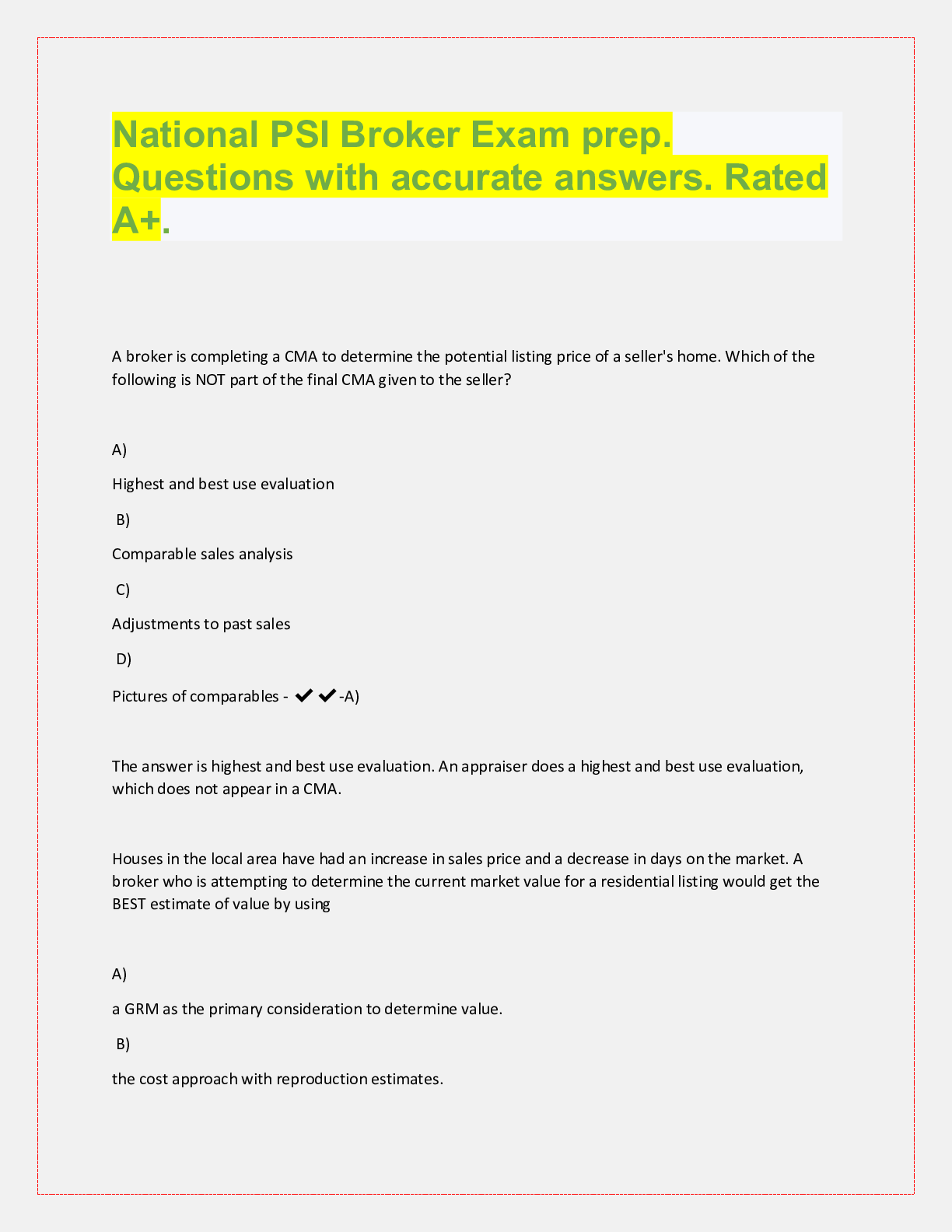
Also available in bundle (1)

PSI Real Estate Broker Exam Bundle. Latest Updates.
Easy Revision Guides For The PSI Broker exam. PSI NATIONAL REAL ESTATE QUESTIONS & Accurate answers. 100% Verified. Rated A+
By bundleHub Solution guider 1 year ago
$44.5
14
Reviews( 0 )
Document information
Connected school, study & course
About the document
Uploaded On
May 05, 2023
Number of pages
44
Written in
Additional information
This document has been written for:
Uploaded
May 05, 2023
Downloads
0
Views
55

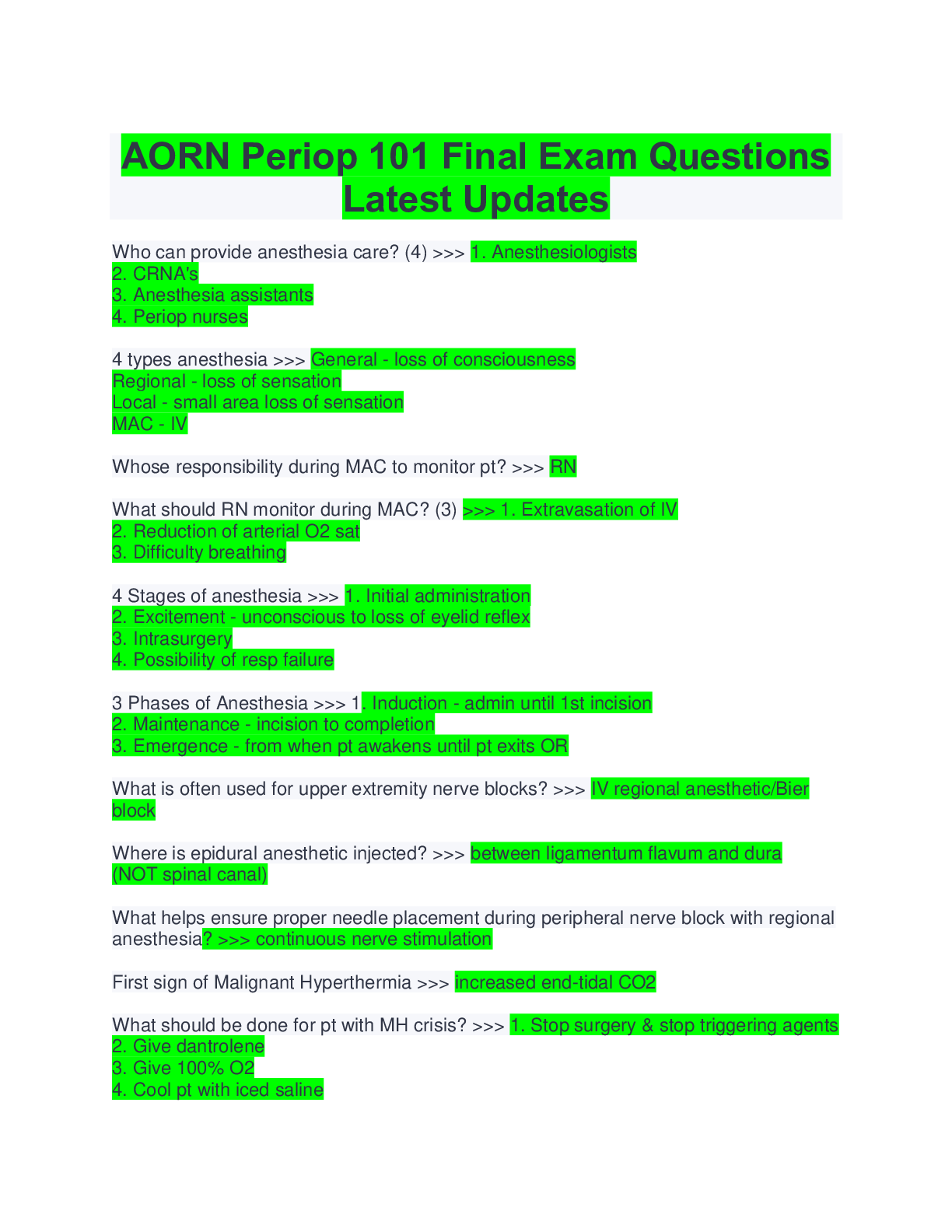
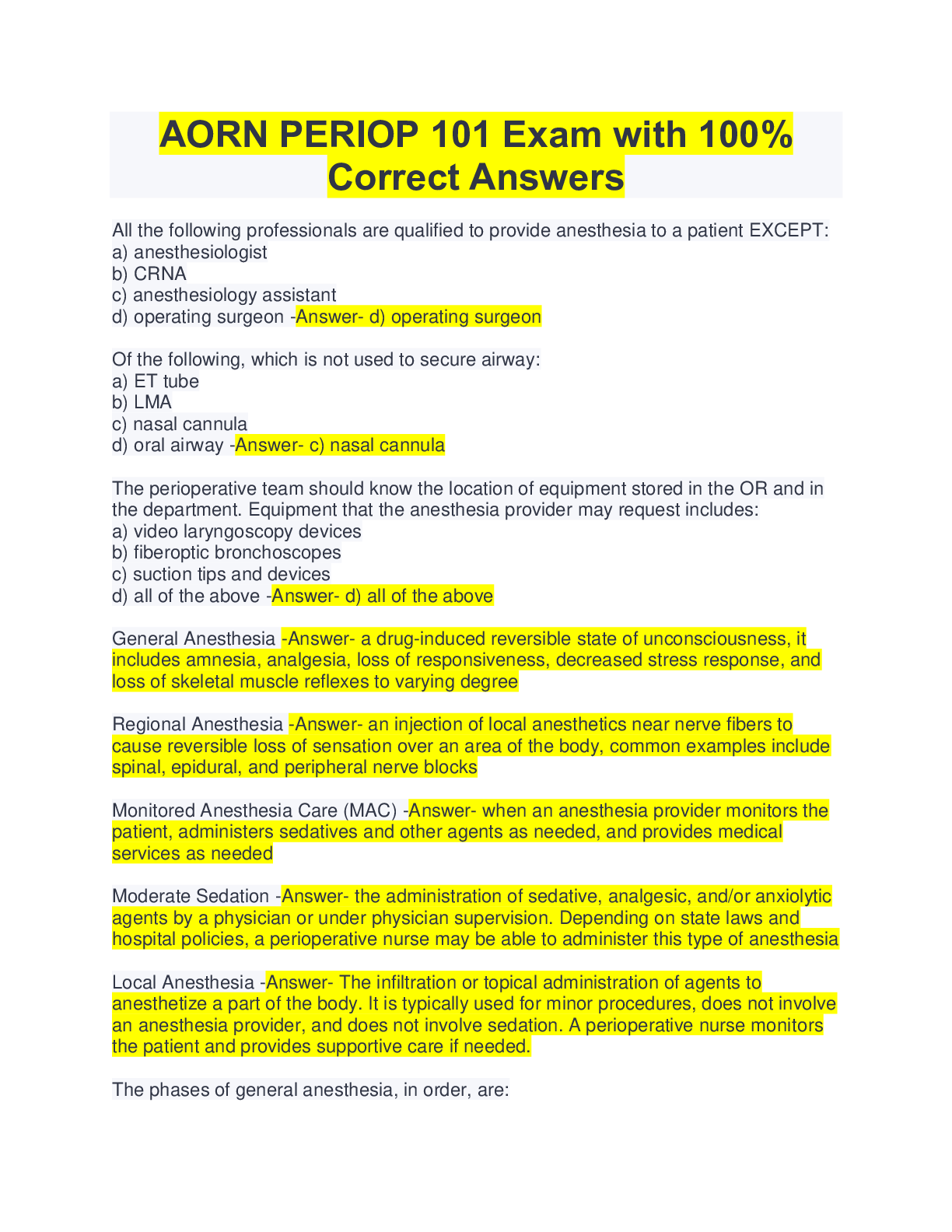

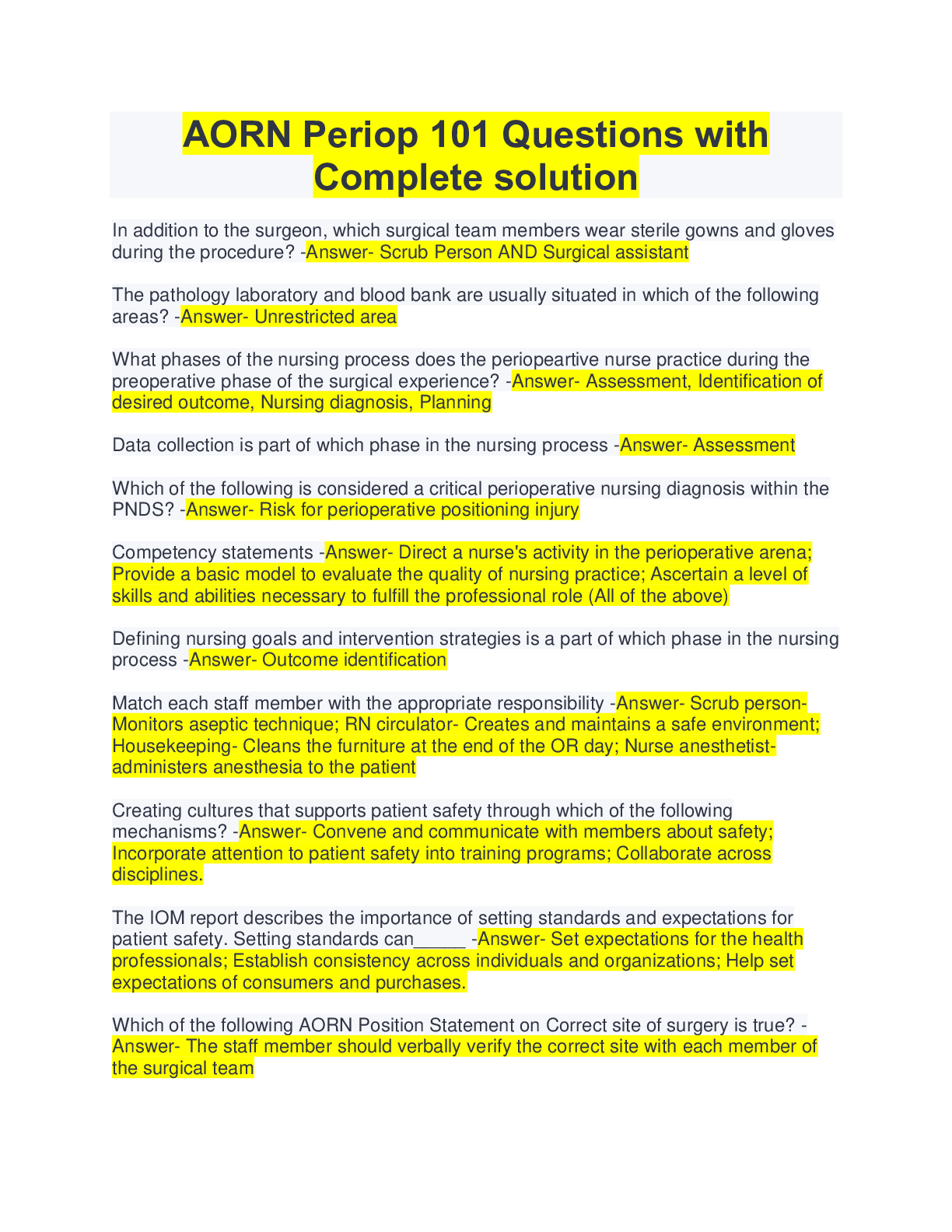
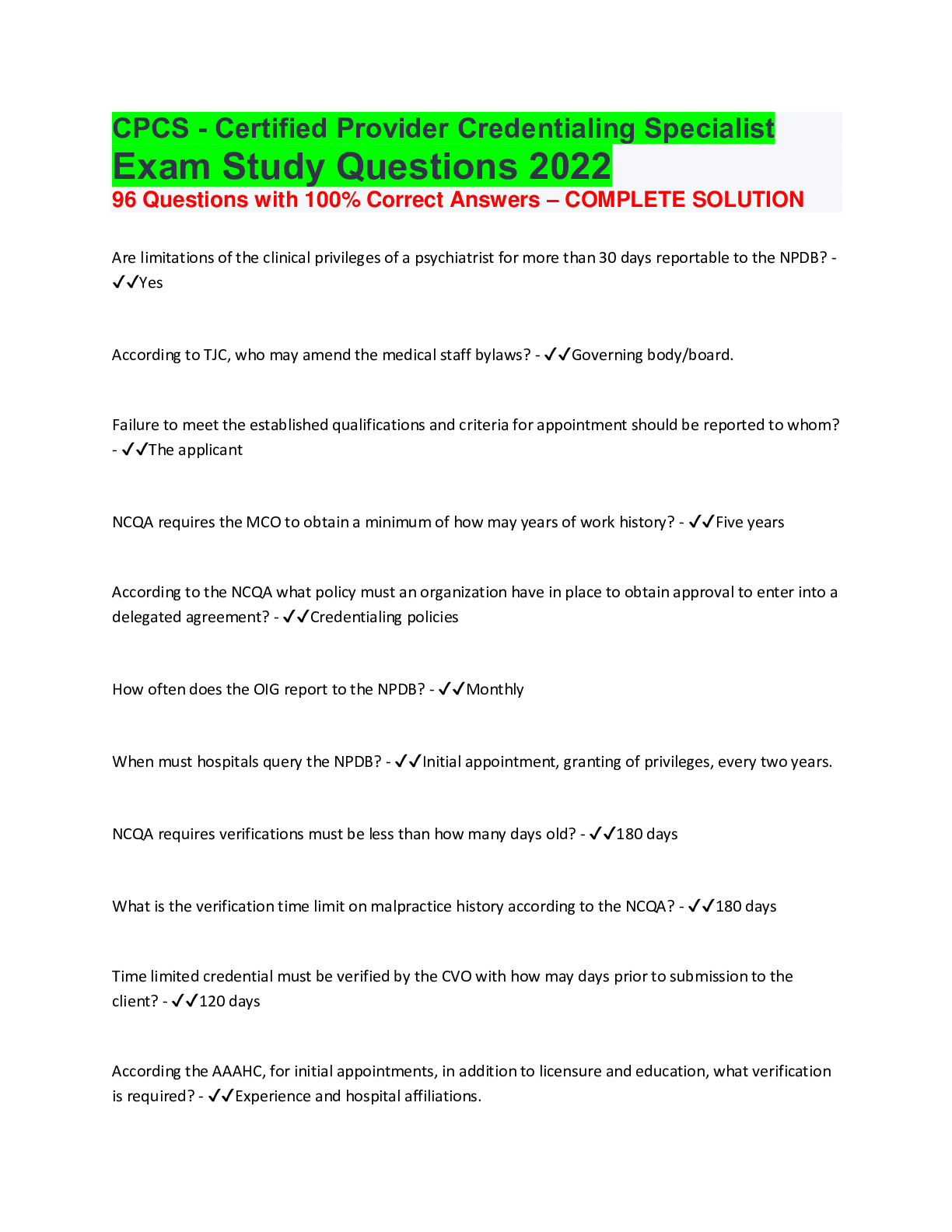
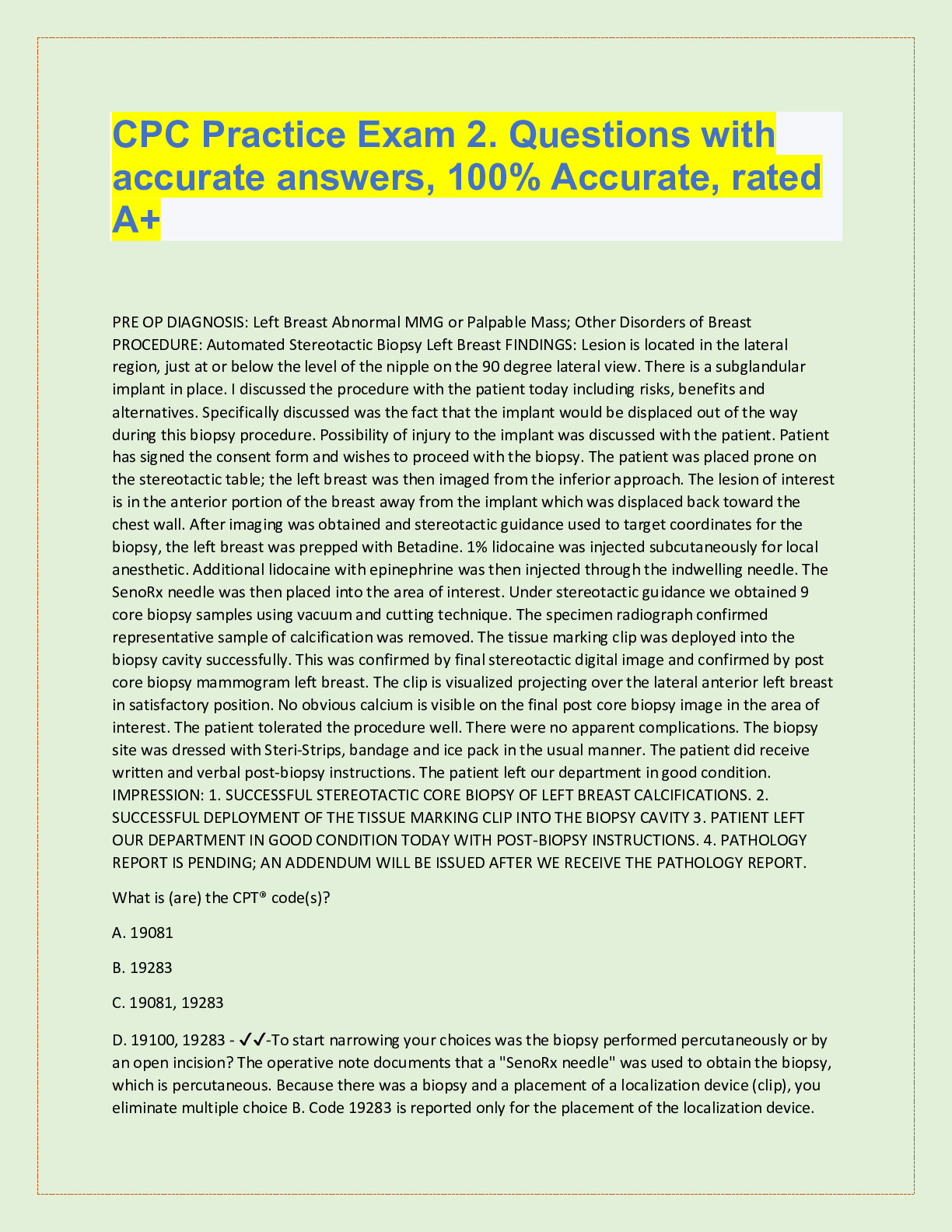
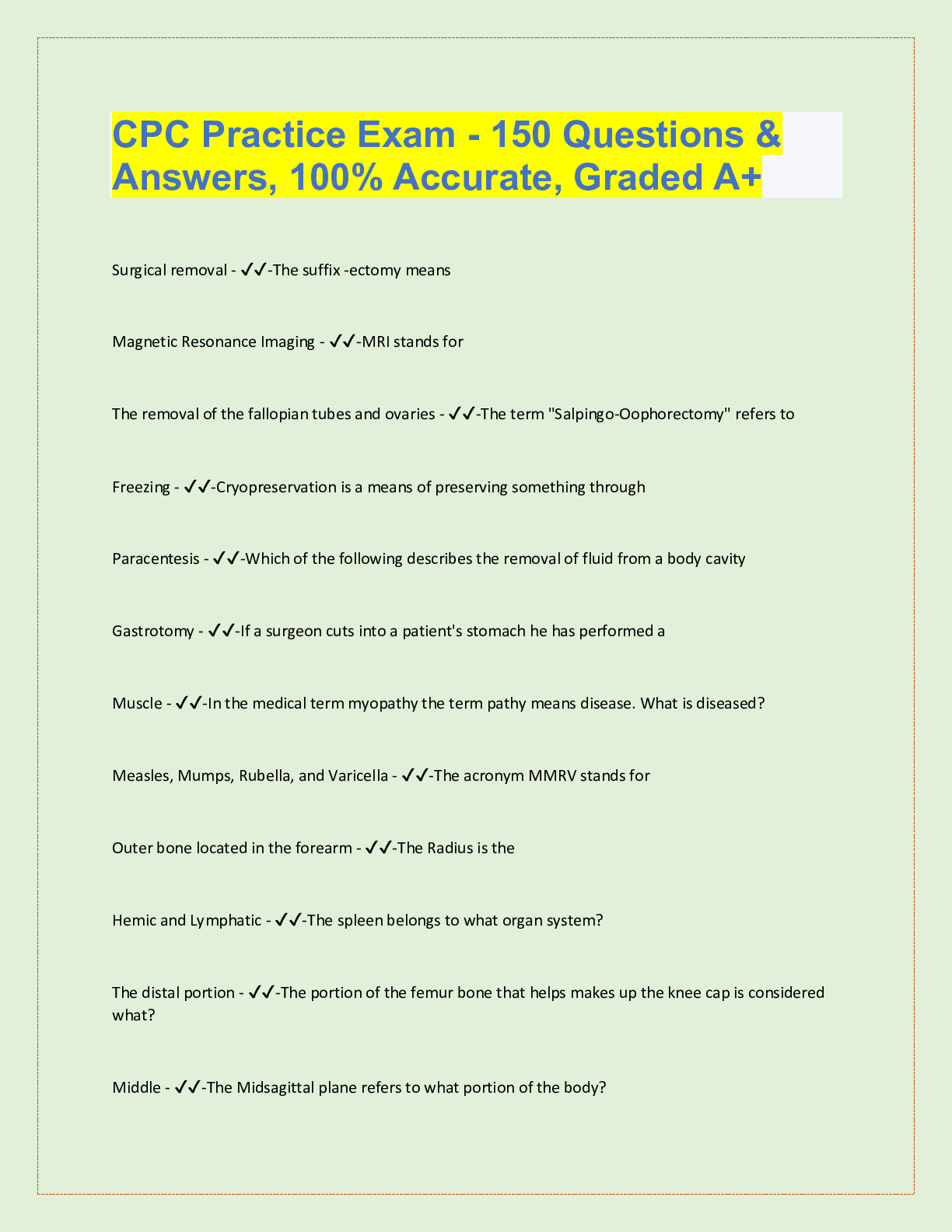
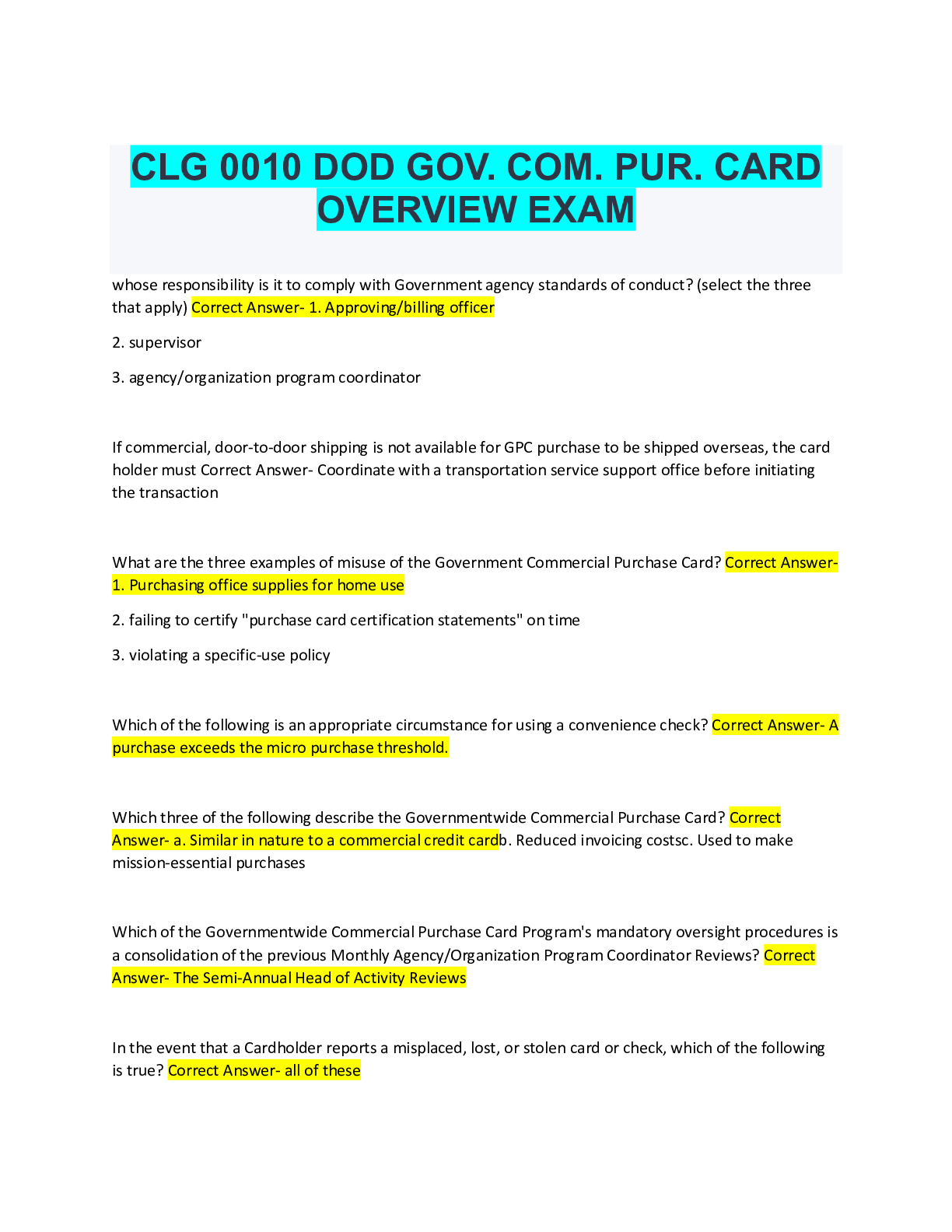


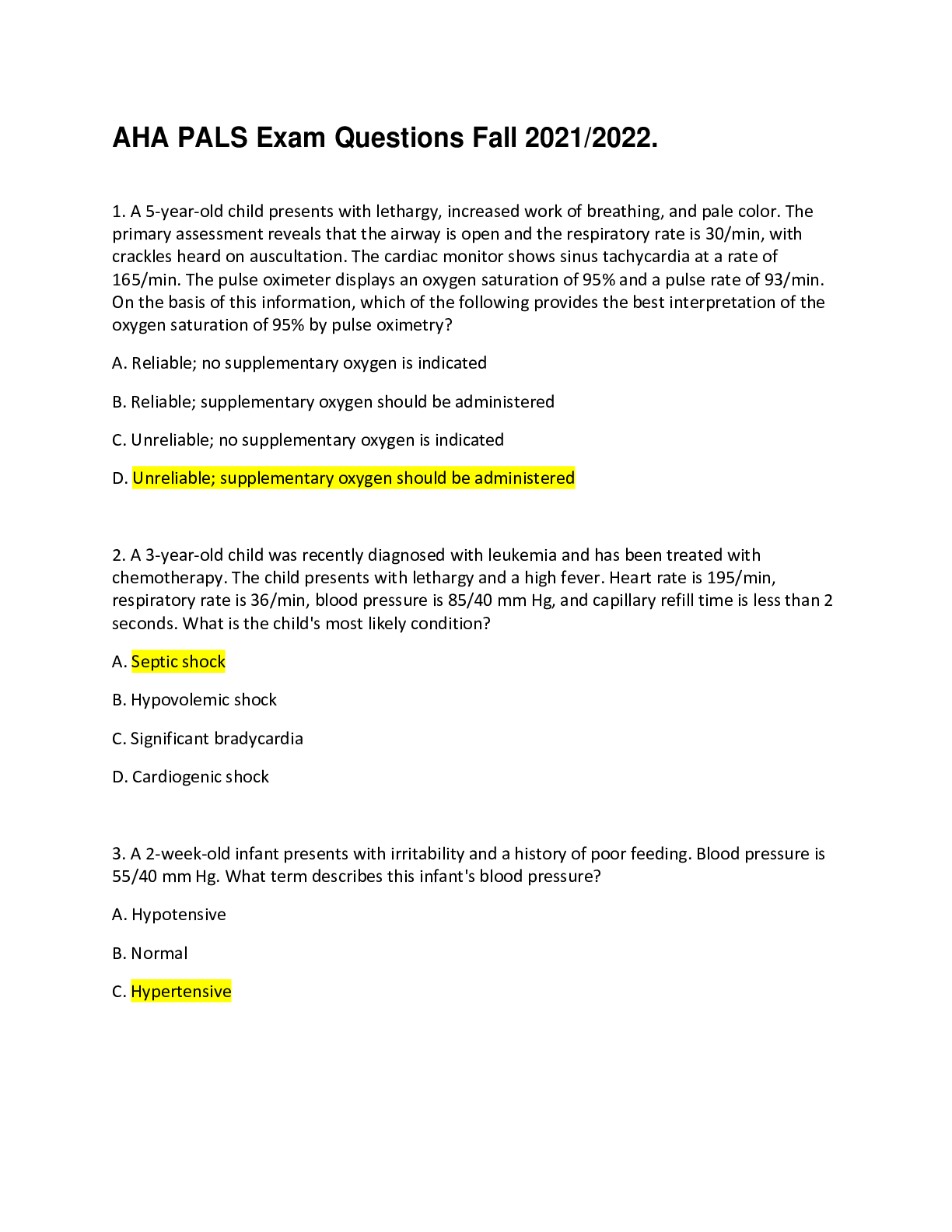
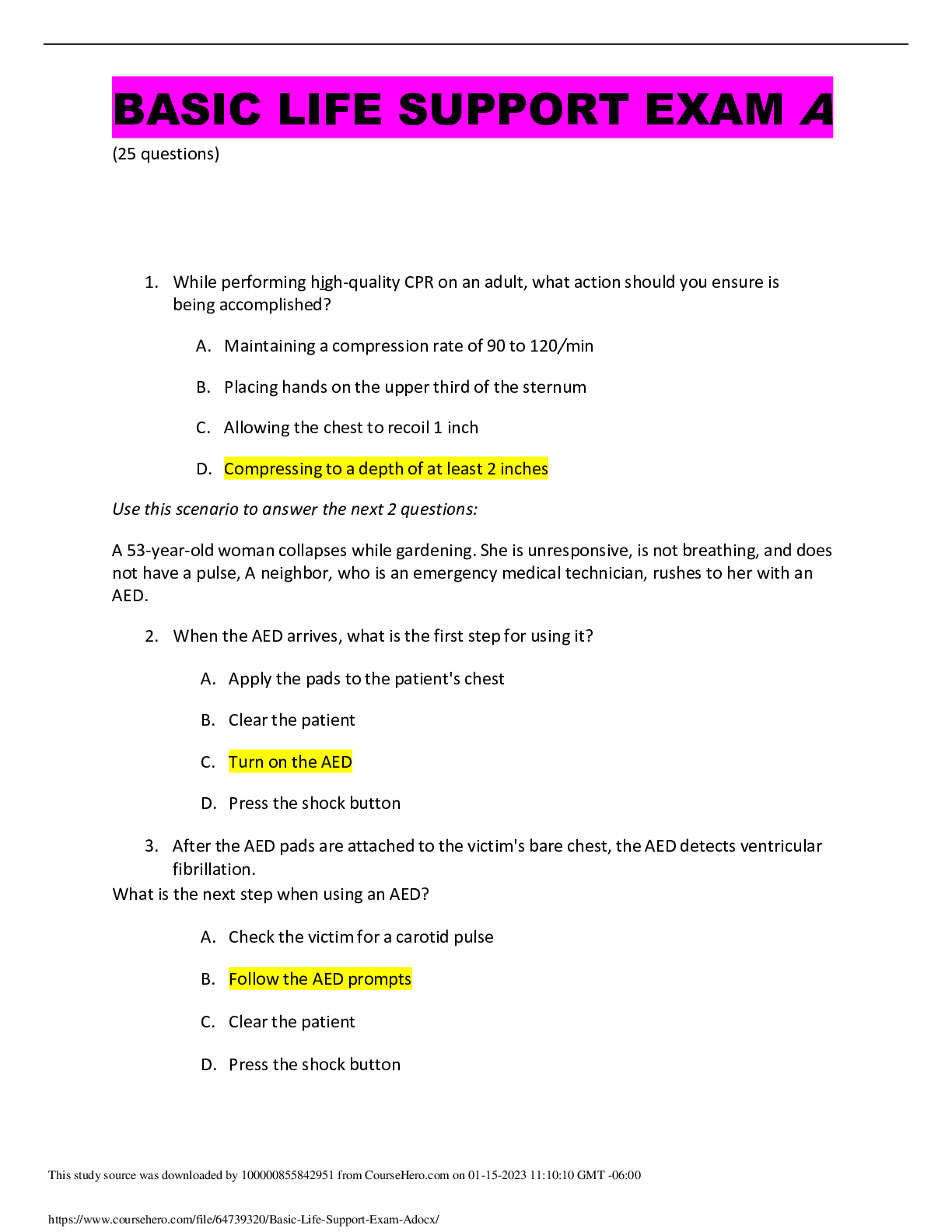
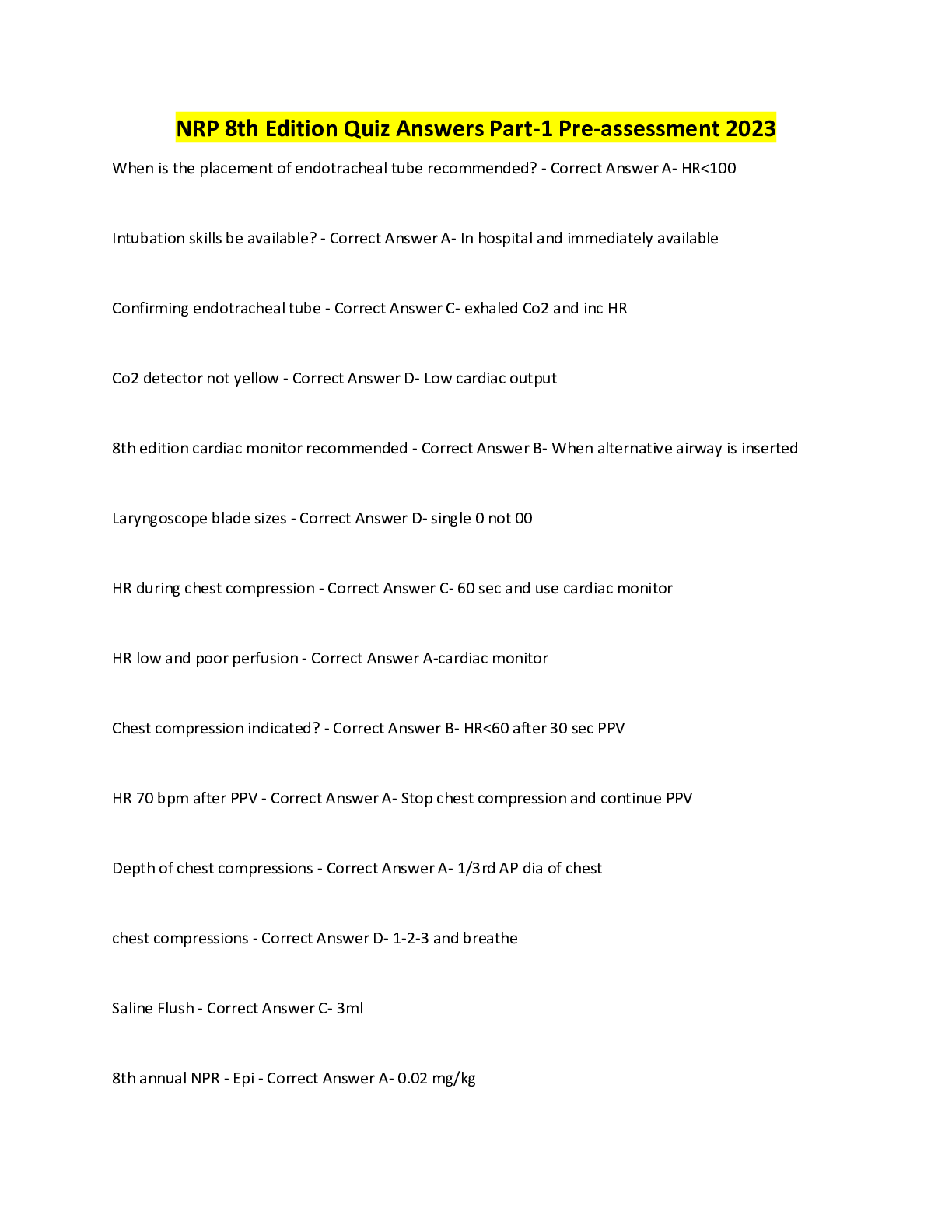

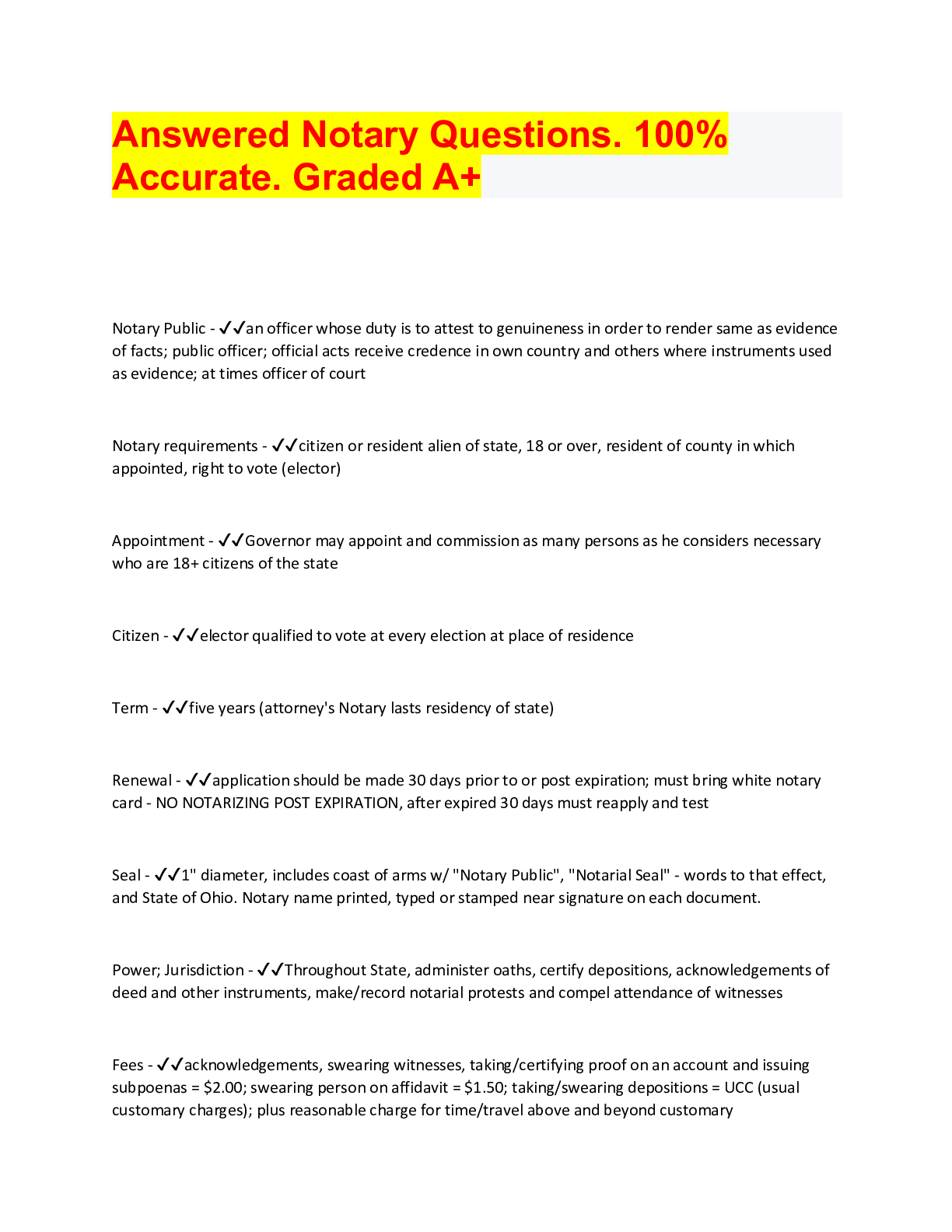

.png)
